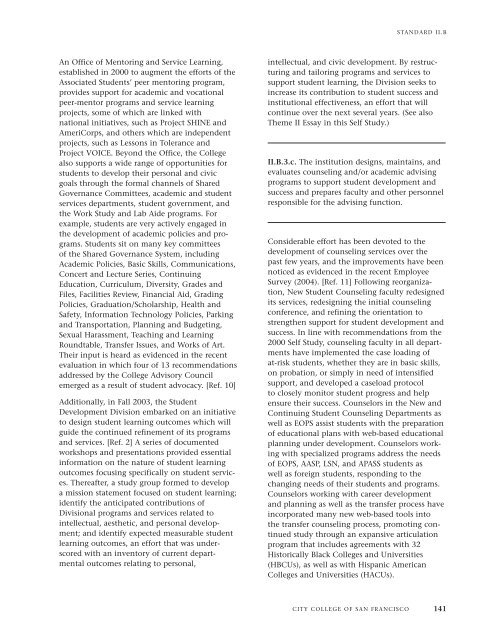City College of San Francisco - California Competes
City College of San Francisco - California Competes
City College of San Francisco - California Competes
You also want an ePaper? Increase the reach of your titles
YUMPU automatically turns print PDFs into web optimized ePapers that Google loves.
STANDARD II.B<br />
An Office <strong>of</strong> Mentoring and Service Learning,<br />
established in 2000 to augment the efforts <strong>of</strong> the<br />
Associated Students’ peer mentoring program,<br />
provides support for academic and vocational<br />
peer-mentor programs and service learning<br />
projects, some <strong>of</strong> which are linked with<br />
national initiatives, such as Project SHINE and<br />
AmeriCorps, and others which are independent<br />
projects, such as Lessons in Tolerance and<br />
Project VOICE. Beyond the Office, the <strong>College</strong><br />
also supports a wide range <strong>of</strong> opportunities for<br />
students to develop their personal and civic<br />
goals through the formal channels <strong>of</strong> Shared<br />
Governance Committees, academic and student<br />
services departments, student government, and<br />
the Work Study and Lab Aide programs. For<br />
example, students are very actively engaged in<br />
the development <strong>of</strong> academic policies and programs.<br />
Students sit on many key committees<br />
<strong>of</strong> the Shared Governance System, including<br />
Academic Policies, Basic Skills, Communications,<br />
Concert and Lecture Series, Continuing<br />
Education, Curriculum, Diversity, Grades and<br />
Files, Facilities Review, Financial Aid, Grading<br />
Policies, Graduation/Scholarship, Health and<br />
Safety, Information Technology Policies, Parking<br />
and Transportation, Planning and Budgeting,<br />
Sexual Harassment, Teaching and Learning<br />
Roundtable, Transfer Issues, and Works <strong>of</strong> Art.<br />
Their input is heard as evidenced in the recent<br />
evaluation in which four <strong>of</strong> 13 recommendations<br />
addressed by the <strong>College</strong> Advisory Council<br />
emerged as a result <strong>of</strong> student advocacy. [Ref. 10]<br />
Additionally, in Fall 2003, the Student<br />
Development Division embarked on an initiative<br />
to design student learning outcomes which will<br />
guide the continued refinement <strong>of</strong> its programs<br />
and services. [Ref. 2] A series <strong>of</strong> documented<br />
workshops and presentations provided essential<br />
information on the nature <strong>of</strong> student learning<br />
outcomes focusing specifically on student services.<br />
Thereafter, a study group formed to develop<br />
a mission statement focused on student learning;<br />
identify the anticipated contributions <strong>of</strong><br />
Divisional programs and services related to<br />
intellectual, aesthetic, and personal development;<br />
and identify expected measurable student<br />
learning outcomes, an effort that was underscored<br />
with an inventory <strong>of</strong> current departmental<br />
outcomes relating to personal,<br />
intellectual, and civic development. By restructuring<br />
and tailoring programs and services to<br />
support student learning, the Division seeks to<br />
increase its contribution to student success and<br />
institutional effectiveness, an effort that will<br />
continue over the next several years. (See also<br />
Theme II Essay in this Self Study.)<br />
II.B.3.c. The institution designs, maintains, and<br />
evaluates counseling and/or academic advising<br />
programs to support student development and<br />
success and prepares faculty and other personnel<br />
responsible for the advising function.<br />
Considerable effort has been devoted to the<br />
development <strong>of</strong> counseling services over the<br />
past few years, and the improvements have been<br />
noticed as evidenced in the recent Employee<br />
Survey (2004). [Ref. 11] Following reorganization,<br />
New Student Counseling faculty redesigned<br />
its services, redesigning the initial counseling<br />
conference, and refining the orientation to<br />
strengthen support for student development and<br />
success. In line with recommendations from the<br />
2000 Self Study, counseling faculty in all departments<br />
have implemented the case loading <strong>of</strong><br />
at-risk students, whether they are in basic skills,<br />
on probation, or simply in need <strong>of</strong> intensified<br />
support, and developed a caseload protocol<br />
to closely monitor student progress and help<br />
ensure their success. Counselors in the New and<br />
Continuing Student Counseling Departments as<br />
well as EOPS assist students with the preparation<br />
<strong>of</strong> educational plans with web-based educational<br />
planning under development. Counselors working<br />
with specialized programs address the needs<br />
<strong>of</strong> EOPS, AASP, LSN, and APASS students as<br />
well as foreign students, responding to the<br />
changing needs <strong>of</strong> their students and programs.<br />
Counselors working with career development<br />
and planning as well as the transfer process have<br />
incorporated many new web-based tools into<br />
the transfer counseling process, promoting continued<br />
study through an expansive articulation<br />
program that includes agreements with 32<br />
Historically Black <strong>College</strong>s and Universities<br />
(HBCUs), as well as with Hispanic American<br />
<strong>College</strong>s and Universities (HACUs).<br />
CITY COLLEGE OF SAN FRANCISCO<br />
141







